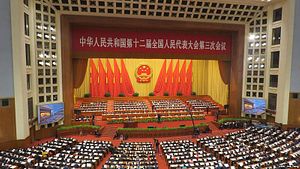As the Chinese Communist Party (CCP) organ tasked with uniting an increasingly diverse group of religious believers, ethnic groups, and the peoples of Hong Kong and Taiwan, the United Front Work Department sure has its work cut out for it. Notwithstanding, it is the department’s additional duty to unite China’s intellectuals—75 percent of whom are not CCP members—under the Party’s leadership, in order to guide China’s economic reform as it struggles to overcome the middle-income trap. To that end, the department has charged non-CCP intellectuals (党外知识分子), especially those in China’s united front democratic parties, with the responsibility of offering criticism and advice on government initiatives.
On May 9, the department’s website published an article titled “[Democratic] Party-Affiliated Intellectuals, Please Bravely Bear Your Supervision Duties” (党派知识分子,请勇敢担起监督责任), stating that the nation’s intelligentsia must: establish political awareness in order to maintain a common political foundation with the CCP; utilize specialized knowledge to advance the 13th Five Year Plan; focus on issues relevant to the people; and understand the government’s policy direction as they participate in democratic oversight through existing platforms, such as the National People’s Congress and the Chinese People’s Political Consultative Conference.
It is notable that even in the above-mentioned piece meant to encourage scholarly advice and criticism, there is a strong emphasis on political boundaries. This fact is unlikely to be lost on China’s scholars. After all, Chinese intellectuals learned early on the dangers of offering advice when called upon to do so by the government, the toughest lesson following the Hundred Flowers Movement in 1957. At Mao Zedong’s repeated behest, intellectuals finally offered extensive criticism that included sharp attacks on low-level cadres. The result was a vicious counterattack known as the Anti-Rightest Campaign, where hundreds of thousands of critics were labeled “rightists” and had their lives destroyed. And while no one is suggesting that another anti-rightest purge is around the corner, the current oppressive political climate targeting anything deemed inconsistent with the Party’s “core socialist values” is not reassuring. Tim Cheek, an expert on Chinese intellectual life at the University of British Columbia in Vancouver, explains that liberal Chinese intellectuals now face the greatest government pressure since the anti-western campaigns of the 1980s. These Chinese academics have no real choice but to either keep their heads low, or leave the country.
However, the CCP seems to admit its own lingering fears regarding its reliance on scholarly advice. The United Front Work Department has recognized new challenges posed by the changing nature of China’s intelligentsia, warranting increased attention from the department to ensure societal stability. New and growing groups of professionals, such as lawyers and accountants, exist primarily outside of the country’s political system, and are viewed as highly mobile and “more ideologically open-minded” (思想比较活跃). Likewise, the Internet is seen as a new platform for outspoken and educated professionals that are willing to express their opinions with critical language. Last but not least, hundreds of thousands of Chinese students returning from abroad comprise a vast knowledge pool for the country, but have also been exposed to unwanted ideological influences in open and free societies.
In sum, the CCP recognizes the challenges posed by China’s transforming intellectual base, and yet remains reliant on intellectuals for professional guidance and advice. The United Front Work Department intends to unite an increasingly diverse group of non-Party intellectuals around itself to both assert CCP control over them and selectively channel their knowledge, in that order. This trend is unlikely to change as the Chinese regime increasingly depends on diverse groups of questionable ideological loyalty to guide China’s economic future.
David Gitter is the editor and Great Helmsman of PARTY WATCH, the premier weekly intelligence report on the activities of the Chinese Communist Party.
































